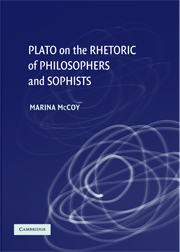Book contents
- Frontmatter
- Contents
- Acknowledgments
- 1 Introduction
- 2 Elements of Gorgianic Rhetoric and the Forensic Genre in Plato's Apology
- 3 The Rhetoric of Socratic Questioning in the Protagoras
- 4 The Competition between Philosophy and Rhetoric in the Gorgias
- 5 The Dialectical Development of the Philosopher and Sophist in the Republic
- 6 Philosophers, Sophists, and Strangers in the Sophist
- 7 Love and Rhetoric in Plato's Phaedrus
- Bibliography
- Index
4 - The Competition between Philosophy and Rhetoric in the Gorgias
Published online by Cambridge University Press: 18 July 2009
- Frontmatter
- Contents
- Acknowledgments
- 1 Introduction
- 2 Elements of Gorgianic Rhetoric and the Forensic Genre in Plato's Apology
- 3 The Rhetoric of Socratic Questioning in the Protagoras
- 4 The Competition between Philosophy and Rhetoric in the Gorgias
- 5 The Dialectical Development of the Philosopher and Sophist in the Republic
- 6 Philosophers, Sophists, and Strangers in the Sophist
- 7 Love and Rhetoric in Plato's Phaedrus
- Bibliography
- Index
Summary
Socrates' approach in questioning his opponents in the Gorgias is quite different than in the Protagoras. Here, we find a Socrates who is far more aggressive, critical, and angry with those whom he questions. Socrates upsets his opponents and even compares Callicles to a kinaidos (passive homosexual), an image that even the bold Callicles finds to be out of bounds (494e). While the conversation begins respectfully, by the dialogue's end we see what seems to be a verbal agôn between Socrates and Callicles. I suggest that Socrates' questions in the Gorgias have an agonistic character because Socrates is engaged in a real battle over the nature of the good life. Socrates' aggressive questions here underscore the tension between his and his opponents' understandings of a virtuous life.
In general, the assumption has been that Plato's aim in the Gorgias is to draw a sharp line of demarcation between the activities of philosophy and rhetoric, favoring philosophy over its obviously inferior opponent. Commentators on the Gorgias have suggested numerous distinctions between philosophy and rhetoric: (1) philosophy requires the consistency of one's beliefs, while rhetoric consists of merely verbal refutation; (2) philosophy requires a commitment to reason that the sophists lack; (3) the philosopher is committed to a different understanding of power – for example, the power to make others virtuous rather than domination over others; (4) philosophers possess a refined self-knowledge that the rhetoricians lack; (5) philosophy values technical knowledge while rhetoric does not; or (6) philosophy is linked to a specific set of moral claims.
- Type
- Chapter
- Information
- Plato on the Rhetoric of Philosophers and Sophists , pp. 85 - 110Publisher: Cambridge University PressPrint publication year: 2007

